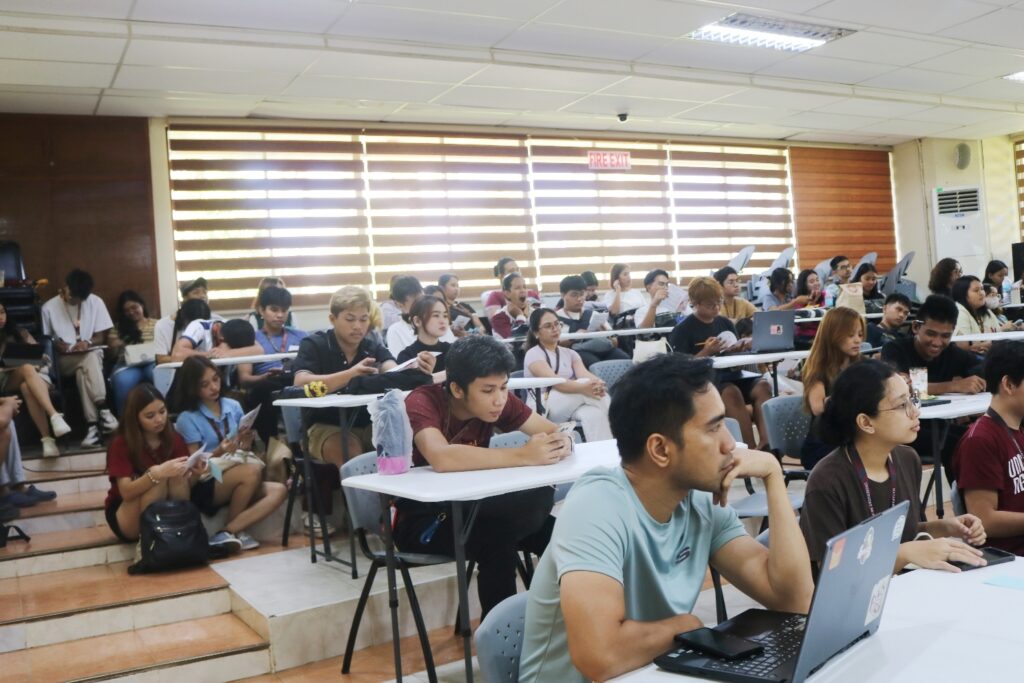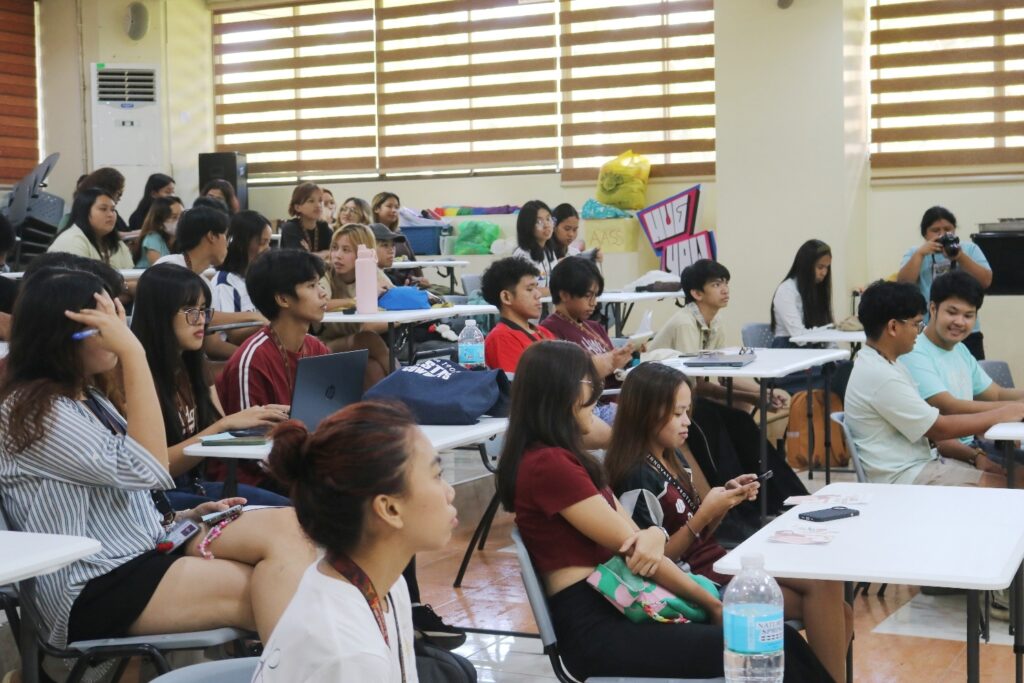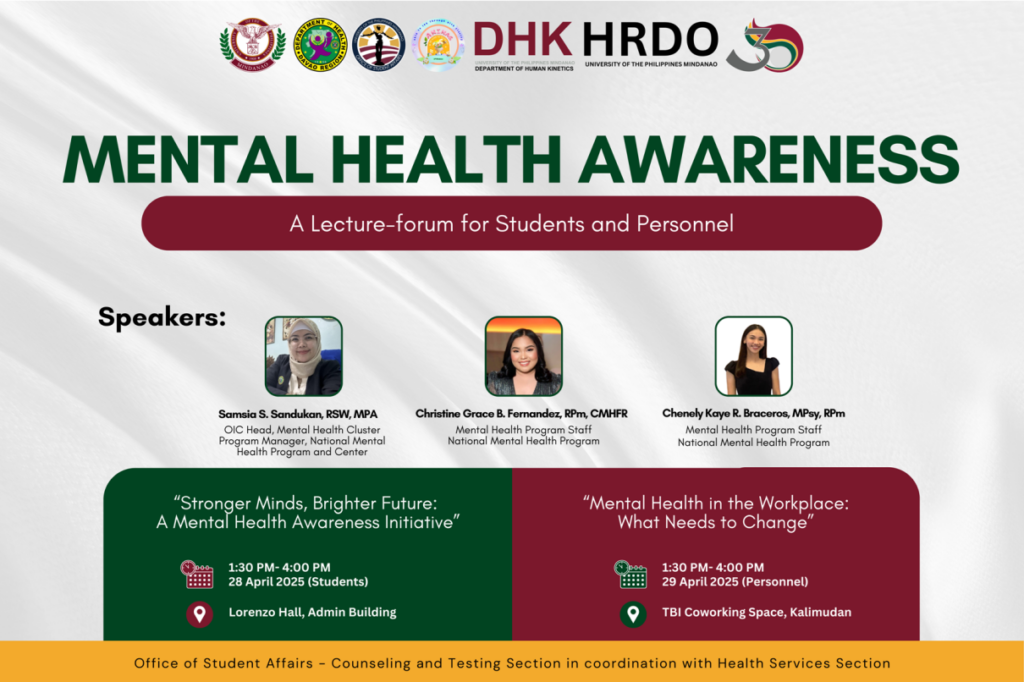
The Office of Student Affairs (OSA), in collaboration with the National Mental Health Program, delivered the “Mental Health Awareness: A Lecture-Forum for Students and Personnel” on April 28 and 29, 2025, in UP Mindanao. The series aimed to encourage open conversations, enhance mental health coping skills, and promote a healthier and more supportive environment for students and university personnel.
The session for students named “Stronger Minds, Brighter Future: A Mental Health Awareness Initiative” was held on April 28, 2025, at the Lorenzo Hall of the Administration Building. Some 120 students attended the lecture forum, which focused on understanding mental health conditions, recognizing symptoms of mental health issues, and practicing self-care to maintain good mental health.
“Mental Health in the Workplace: What Needs To Change,” the session for personnel and auxiliary service providers (janitors, guards), was held on April 29, 2025, at the TTBDO TBI Coworking Space at Kalimudan Center. Some 67 personnel attended face-to-face, while 39 attended online. The discussions dwelt on mental health in the workplace, including strategies for coping with psychological stress at work, managing feelings of work burnout, and improving a person’s work-life balance.
The lecture forum series was conducted by professionals from the National Mental Health Program, led by Samsia Sandukan, a Registered Social Worker and OIC-Head of the Mental Health Cluster, and a Program Manager of the National Mental Health Program and Center. OIC Sandukan was supported by colleagues Christine Grace Fernandez, a Registered Psychometrician (RPm) and Certified Mental Health First Responder (CMHFP), and Chenely Kaye Braceros, RPm, and a Master of Psychology (MPsy).
The top photo shows resource person Christine Grace Fernandez at the student session at the Lorenzo Hall.
Psychometrician Fernandez spoke of coping and coping skills, such as Emotional Regulation which includes deep breathing, mindfulness, and visualization; Cognitive reframing which involves changing the way we think about a situation to change how we feel about it; Problem-solving which involves identifying a problem and taking steps to resolve it, such as brainstorming for potential solutions; and Relaxation such as deep breathing, progressive muscle relaxation, and yoga. She prescribed Self-Care, such as exercising, eating a healthy diet, getting enough sleep, and making time for hobbies and leisure activities.
Psychometrician Braceros spoke about Self-Care, which involves taking an active role in protecting one’s well-being and happiness through a wide range of activities that promote physical, mental, and emotional health. She also prescribed Self-Soothing, which she described as a distress-tolerance skill that involves intentionally using one’s senses to bring comfort and reduce emotional distress; a “first-aid” for emotional distress. She stressed that taking care of yourself doesn’t mean “me first, but it means me too.”
OIC Sandukan opened the lectures by introducing Republic Act 11036, The Mental Health Act, “An Act Establishing A National Mental Health Policy For The Purpose Of Enhancing The Delivery Of Integrated Mental Health Services, Promoting And Protecting The Rights Of Persons Utilizing Psychiatric, Neurologic And Psychosocial Health Services, Appropriating Funds Therefor, And For Other Purposes.”
She connected this to the Civil Service Commission (CSC) Memorandum Circular No. 04, s 2020, “Mental Health Program In the Public Sector,” the Department of Health (DOH) Department Order No. 2022-0578, “Guidelines on the Implementation of the Mental Health Program for the Workplace in the Department of Health,” and DOH-Davao Center for Health Development (DCHD) Order No. 2020-0055, “Mental Health Workplace Policy of DOH DCHD.”
The forum series was organized by the OSA Counseling and Testing Section, led by Guidance Services Specialist Remigio Dimingo, and held in collaboration with the OSA Health Services Section, ANINAG Peer Facilitators, DHK-NSTP Classes, HRDO, and the DOH XI Mental Health Cluster.
“Mental health awareness is an important initiative to improve understanding of mental health conditions and increase access to healthcare for those who need it,” stated Specialist Domingo.
“A greater understanding of mental illness can allow people to recognize those in their lives who may be dealing with anxiety, depression, or other conditions that affect their mental well-being,” he said.
“Some who are struggling with anxiety, depression, burnout, or stress keep it to themselves,” he said.
“By having open conversations and raising awareness around mental health, one can teach students and personnel how to recognize those symptoms, get them to understand the importance of self-care and mental well-being. Workers learn ways to cope with a toxic workplace, ease the stress of remote working, and improve one’s work-life balance,” he said.

Glimpses of the student session at the Lorenzo Hall

Glimpses of the student session at the Lorenzo Hall

